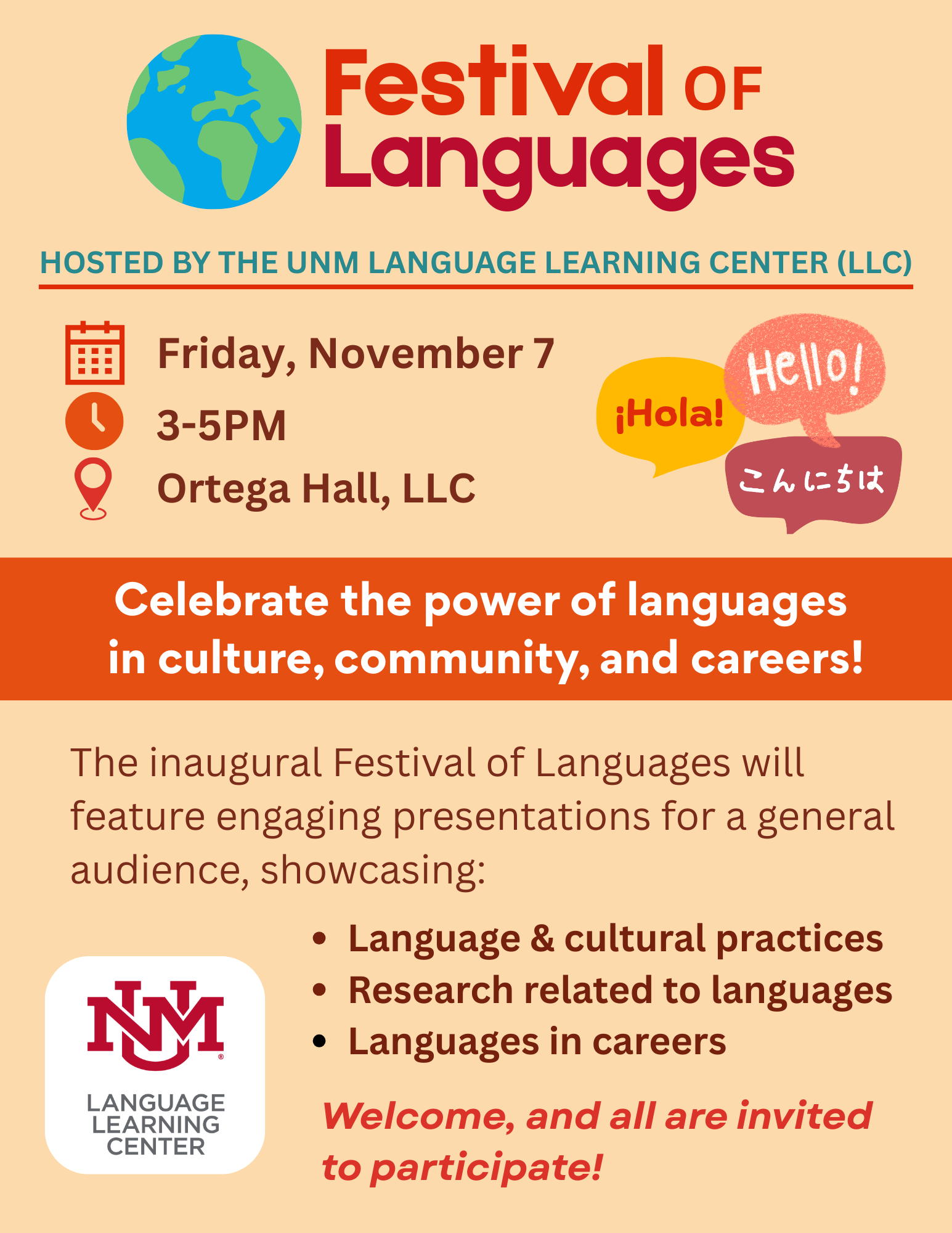Festival of Languages
 | On Friday, November 7th, 2025, the Language Learning Center (LLC) will host the inaugural Festival of Languages (FOL) from 3:00-5:00pm. This event highlights the value of languages in our communities and careers. The Festival of Languages will showcase twenty-eight presentations to highlight language and cultural practices, research related to languages, and languages and careers. See the chart for the full schedule, with presentation descriptions below. |
| Location | 2:00-3:00pm | 3:00-3:30pm | 3:30-4:00pm | 4:00-4:30pm | 4:30-5:00pm | 5:00-5:30pm |
Lab 1 (Ortega Hall, Rm. 135) | Multilingualism Matters Panel Discussion, Room 335 | Analy Morales "Put Your Bilingualism to Work" | Laura Perez "Language Access in the Judiciary" | Zaynab Yedra-Schaefer "About International Studies" | Leah N'Diaye "The Power of Langauges in the Age of AI" | Post-FOL snacks, socializing |
Lab 2 (Ortega Hall, Rm. 137) | Heather Sweetser"Arabic Coffee" | Oona Takano, Jackson Tarbox, & Morgan West "Poetic Resistance: May Ayim & Afro-German Identities" | Catherine Rhodes, Edber Dzidz Yam, Irma Pomol Cahum, & Miguel Oscar Chan Dzul "Learn Maya at UNM: An Indigenous Language of Mexico" | David Wilson "Language Goes to School: The Making of a Podcast about Multilingual Education in New Mexico--and Beyond" | ||
Lab 3 (Ortega Hall, Rm. 141) | Carmen Julia Holguín-Chaparro "Español, más que solo una lengua" | Ryuichi Nakayama "Japanese Onomatopoeia" | Machiko Bomberger "Japanese Tea Ceremony" | |||
Lab 4
(Ortega Hall, Rm. 143) | Chwienui Helen Ghogomu "The Experience of Translating French Into an African Language" | Mami McCraw "Origami" | Elliot Jackson "A Cross-Linguistic Analysis of Gender-Inclusive Pronoun Resolution" | Shewar Khan "Hegemonizing Ideology in Online Spaces: The Case of Pakistan's Women's March" | ||
Lab 5 / Sign Lab (Ortega Hall, Rm. 147) | Thierry Samuel Boubda & Noah Mertz "Kouang (dance) & Poetry" | Catherine Rhodes & Laura Ahearn "Language is Culture: Linguistic Anthropology in IB Programs and via an online, bilingual course between the U.S. and Mexico" | Akasha Khalsa "Decoding Torá: Creating Learning Resources for a Lost Language" | Toby Fowler, Danielle Etsitty, Devin Lansing, Gabrielle Jack, Aline Xavier "Student Perspectives of the Navajo Language Program" | ||
Lab 6 (Ortega Hall, Rm. 149) | Paul Twitchell "So You Want to Help Deaf People?" | Jill Morford, Patrick Shije, Andreas Shije, Melanie Kirk-Lente, Kayleigh Russell, & La Ban Hendricks "Pueblo Hand Talk, an Indigenous Signed Language of New Mexico" | Amelia Abbott "Multilingualism Across Modalities" | Heather Sweetser "Government Language Careers" | ||
Ortega Reading Room (Room 335) | Joseline Segovia "Bridging Language Barriers in Law Enforcement: Language Access at APD" | Sebastián Cárdenas "Modern Nahuatl" | Wenfang Zhang "Chinese Dumpling-Making" | |||
Ortega Lounge (Room 322) | Drinks / Refreshments in the Ortega Lounge Infomation Tables about the Mellon Foundation, SpanPort Programs, the Center for Teaching & Learning, & Study Abroad | |||||
Lab 1, 3:00-3:30pm, Analy Morales, “Put Your Bilingualism to Work”
Analy Morales, a UNM alumna and entrepreneur, will talk through her professional journey as an interpreter and discuss possible paths for future interpreters.
Lab 1, 3:30-4:00pm, Laura Perez, “Language Access in the Judiciary”
Laura will be providing information regarding language access services in NM courts. Information will include language access at the window, the courtroom, translation services, and statistics. Questions from the audience are encouraged.
Lab 1, 4:00-4:30pm, Zaynab Yedra Schaefer, “About International Studies”
Zaynab's presentation will focus on the interdisciplinary field of international studies and what it offers to UNM undergraduate students, both as a Major, Double Major, and/or Minor. She will discuss how students can make intersections within the Major, as it is very broad and can apply to many sections of career, school, and personal life. She will discuss how her time as an undergraduate in international studies has enabled her to explore her career, alongside her personal endeavors, such as how multicultural communication skills support her DJ Career. As the Public Relations Officer for the ISSA (International Studies Student Association), she will also speak on how to further the program through the ISSA.
Lab 1, 4:30-5:00pm, Leah N’Diaye, “The Power of Languages in the Age of AI”
This presentation explores why learning languages remains a critical skill in our interconnected, AI-driven world. Drawing from her own journey learning and teaching languages, Leah will highlight the cognitive, cultural, and career advantages of multilingualism — and why language learning matters now more than ever.
Lab 2, 3:00-3:30pm, Heather Sweetser, “Arabic Coffee”
This presentation will be about the history of coffee and the origin stories of drinking it - the myths, legends, and reality. Language will also be discussed in the sense that the words 'coffee' and 'sugar' come from Arabic, as well as other related words like bunn (seen on the sides of coffee machines at coffeeshops). Participants will drink Arabic (Turkish) coffee and will have the chance to ask questions about coffee's history as well as differences in preparing coffee worldwide, from American drip coffee to Arabic ibriq and the Japanese siphon.
Lab 2, 3:30-4:00pm, Oona Takano, Jackson Tarbox, & Morgan West, “Poetic Resistance: May Ayim & Afro-German Identities”
Students from Professor Jason Wilby’s German 2120/301 class will be presenting three poems from the Afro-German poet May Ayim, along with information about her and her role in the development of Afro-German identities. They will present the information in English and read the poems in German, with English translations provided. The presentation will offer time for discussion and questions.
Lab 2, 4:00-4:30pm, Catherine Rhodes, Edber Dzidz Yam, Irma Pomol Cahum & Miguel Oscar Chan Dzul, “Learn Maya at UNM: An Indigenous Language of Mexico”
This presentation is co-authored and will be co-presented by Dr. Catherine Rhodes, Director of UNM's Maya (Yucatec) Language Program, and three Maya language instructors. First, they will briefly introduce the audience to the Maya (Yucatec) language, as spoken on the Yucatan Peninsula in Mexico. This will include a brief overview of Indigenous languages and language shift and an engaging activity in Maya with the audience. Second, they will introduce the audience to UNM's Maya language course offerings--six semesters and one summer program--and provide information about how interested people can join the courses. They regularly admit heritage speakers and students from other universities through our Latin American Indigenous Studies Alliance (LAISA; comprised of UCLA, Stanford, UC Berkeley, UNM, and University of Utah). Finally, they will take questions from the audience.
Lab 2, 4:30-5:00pm, David A. Wilson, “Language Goes to School: The Making of a Podcast about Multilingual Education in New Mexico—and Beyond”
This is the backstory of the creation of a podcast about the intersection of multilingualism and schools. The podcast is currently in its 5th season. David will present orally, in English, with accompanying slides. He will engage the audience by offering concrete examples, audio excerpts, and by soliciting verbal contributions from the rich and varied knowledge bases of the attendees.
Lab 3, 3:00-4:00pm, Carmen Julia Holguín Chaparro, “Español, más que solo una lengua” (Spanish, more than just a langauge)
Carmen will host a game table where students can answer questions related to Latin América and Spanish culture and language and win prizes. She will also have bookmarks and informative flyers about Spanish programs offered by the Department of Spanish & Portuguese.
Lab 3, 4:00-4:30pm, Ryuichi Nakayama, “Japanese Onomatopoeia”
Ryuichi will start by playing the onomatopoeia game, and then introduce some words mainly used in daily life in Japan and Manga.
Lab 3, 4:30-5:00pm, Machiko Bomberger, “Japanese Tea Ceremony”
Machiko will show a video about tea ceremony history and how it is conducted. Then, she will demonstrate making tea so the audience can experience the way of drinking tea and its taste. If time permits, participants can try making tea.
Lab 4, 3:00-3:30pm, Chwienui Helen Ghogomu, “The Experience of Translating French into an African Language”
Language is an ideology. It is the idea of an individual that takes root in society because it finds collective agreement. The presenter will discuss the work of Boris Diop and his understanding of the responsibility of France in the Rwandan genocide, as well as his own literary work in French as complicity with France’s colonial logic. Diop became committed to producing culture within Africa, engaging in pedagogy with the aim of teaching Senegalese (Wolof) to Senegalese people, and writing in Wolof. Later, Diop returned to writing in French. This presentation will reflect on the question of how financially sustainable it is to write in an African language. It will particularly engage with the words of Mongo Beti, who once asked in a thought-provoking article: “In what language should an African writer write?”
Lab 4, 3:30-4:00pm, Mami McCraw, “Origami”
Japanese Instructor Mami McCraw will demonstrate origami and make pieces with participants.
Lab 4, 4:00-4:30pm, Elliot Jackson, “A Cross-Linguistic Analysis of Gender-Inclusive Pronoun Resolution”
This presentation will focus on a cross-linguistic analysis of how both humans and large language models (LLMs) across several languages (English, Russian, German, and Spanish) resolve ambiguous sentences containing multiple potential referents under a few conditions. Previous research has shown that readers tend to rely heavily on gendered stereotypes in pronoun resolution, frequently associating occupations like "doctor" or "mechanic" with masculine pronouns and occupations like "nurse" or "caregiver" with feminine pronouns.
Until recently, LLMs have been observed to display similar gender biases as humans, but possibly as a result of supervised fine-tuning (SFT) and reinforcement learning through human feedback (RLHF), an emerging tendency toward a more female-dominant paradigm has been observed in LLMs. This presentation will explore these phenomena, while also presenting research showing how gender-neutral pronouns might help to mitigate gender bias (as well as the challenges facing gender-inclusive language). Audience members will be invited to participate (either with the group or individually) to see how they resolve ambiguous sentences on their own, while also demonstrating how recent updates to AI chatbots like ChatGPT or Claude reflect (or refute) these trends. Does this new trend toward a female bias suggest greater inclusivity? Or is this just further evidence that chatbots merely echo--and even amplify--existing human attitudes and perceptions?
Lab 4, 4:30-5:00pm, Shewar Khan, “Hegemonizing Ideology in Online Spaces: The Case of Pakistan’s Women’s March”
Shewar will give a presentation on my research on the discourse analysis of online commentary of Facebook users on a women’s rights movement in Pakistan. The study seeks an understanding of the discursive techniques used to establish a dominant social narrative through linguistic features, uncover underlying ideologies of power and analyze how these ideologies are promoted through discourse production inspired by religion and culture. The women’s right movement in Pakistan was heavily criticized by Facebook users who referred to social and religious institutions along with cultural role models and figure heads to legitimize their patriarchal discourse; adapted moral and cautionary tales and also employed the use of metaphors and word binaries to designate dichotomies of good and bad women, reinforcing ideas of acceptable roles, spaces and life choices for women. The research offers an interesting study on the role the language plays in creating, legitimizing and enforcing competing discourses which can also be used to delegitimize, dehumanize or demonize the "other."
Lab 5, 3:00-3:30pm, Thierry Samuel Boubda & Noah Mertz, “Kouang (dance) & Poetry”
Thierry and Noah will feature a dance that showcases cultural diversity. Thierry will also be reading one of his poems.
Lab 5, 3:30-4:00pm, Catherine Rhodes & Laura M. Ahearn, “Language is Culture: Linguistic Anthropology in IB Programs and via an online, bilingual course between the U.S. and Mexico”
This presentation has five goals. It is co-authored by Catherine Rhodes and Laura Ahearn. First, they will introduce the audience to linguistic anthropology, a unique disciplinary perspective that views language as a form of social action. They will show the relevance of core ideas in linguistic anthropology to contemporary issues, such as the Trump administration's "English only" efforts. Second, they will share with the audience the high school International Baccalaureate (IB) programs that feature coursework in linguistic anthropology. Third, they will share a brand-new collaborative online international learning (COIL) course that will be taught at UNM starting in Spring 2026. The course is a fully-bilingual (Spanish and English) introductory course in linguistic anthropology that will be taught as a shared (synchronous) online classroom between UNM and the UADY (Universidad Autónoma de Yucatán) in Mexico. Fourth, as part of their discussion about the COIL course, they will introduce the audience to two new books that they are co-authoring, which will be the core text for the COIL course. The books are the English 4th edition and Spanish 1st edition of the internationally popular text, Living Language: An Introduction to Linguistic Anthropology. In the COIL course, students from both countries will conduct collaborative projects in English, Spanish, or translanguaging, depending upon their language skills. (Rhodes is seeking a cross-listing with Spanish so that they can also take the course for Spanish-language credit.) The course provides opportunities for academic language development in Spanish and English and cross-cultural exchange without having to travel. It provides a model for how languages can be used across the curriculum, and it provides a model for how UNM can provide higher education in Spanish, serving its primary audience in New Mexico, which is the US state with the highest number per capita of Spanish speakers. Fifth, in the presentation they will provide examples of how linguistic anthropology can be used in a wide range of careers. They will leave time for Q&A.
Lab 5, 4:00-4:30pm, Akasha Khalsa, “Decoding Torá: Creating Learning Resources for a Lost Language”
Akasha will present the topic of her MA thesis, which is a description of the dormant (no-longer-spoken) Amazonian language Torá. The Torá community, which survived a genocide and now has a recognized reservation in Brazil, has expressed a desire to revitalize their lost heritage language. However, the work of writing a Torá language description and creating materials for the community involves many challenges due to the very limited data in existence. Published in 1925 by a non-linguist, the data has received almost no previous analysis, and in its current form it is fairly useless to the community. In her presentation, she would like to discuss in a simplified manner how she is solving some of the many problems with the data, and what kinds of materials she is creating for the community to foster language reclamation.
Lab 5, 4:30-5:00pm, Toby Fowler, Danielle Etsitty, Devin Lansing, Gabrielle Jack, Aline Xavier, “Student Perspectives of the Navajo Language Program”
Toby will present some student workers’ stories from their time at the Navajo Language Program (NLP), a program here within the Department of Linguistics focusing on the projects that their students are working on. The main focus is to share the current development of the Navajo language curriculum at UNM, as it is created for students, by students. Additionally, they will discuss the intersection between this work and the students’ own identities and culture. Many of these students are not linguistics majors, so they want to showcase that taking an active part in language and linguistics isn't only for linguistics majors, but for those who want to preserve and support their language.
Lab 6, 3:00-3:30pm, Paul Twitchell, “So You Want to Help Deaf People?”
The Signed Language Interpreting Program offers two paths: a Major degree track that focuses on Signed Language Interpreting & a Minor track in ASL. This presentation will focus on future careers focusing on the Deaf community in New Mexico. Working as an Interpreter in K-12 setting, community, and other advanced fields (i.e. medical, legal). While the major program focuses on Interpreting, Paul will also address general careers with a minor in ASL: working as a community member, teaching, therapy, social worker, etc.
Lab 6, 3:30-4:00pm, Jill Morford, Patrick Shije, Andreas Shije, Melanie Kirk-Lente, Kayleigh Russell, & La Ban Hendricks, “Pueblo Hand Talk, an Indigenous Signed Language of New Mexico”
The research team, consisting of a UNM undergrad, 2 UNM grad students, Dr. Morford, 2 Deaf community members, and an interpreter will first explain that American Sign Language (ASL) is not the only signed language used in North America. They will introduce the concept of Hand Talk and then explain that they are documenting Pueblo Hand Talk in collaboration with members of Zia Pueblo. They will show some Pueblo Hand Talk signs and ask people to guess what they mean. Then they will tell them the meaning of the signs and invite them to try to sign them with us. If time permits, they will also explain the meaning of the Zia symbol on the New Mexico flag. The presentation will be in English, ASL and Pueblo Hand Talk. They will have a handout with quick facts about Pueblo Hand Talk to share with the audience.
Lab 6, 4:00-4:30pm, Amelia Abbott, “Multilingualism Across Modalities”
Amelia will discuss how exploring the modalities of signed languages (such as ASL) and tactile languages (such as ProTactile) can provide insights into the study of Second Language Acquisition (SLA) and linguistics in general, that cannot come from study of spoken language alone. She will also discuss how being multilingual in multiple modalities (i.e. knowing a spoken language and a signed language, rather than just multiple spoken languages) can change the way the brain processes and uses language. She will also talk about the challenges and benefits of learning a new language in a new modality. To engage a general audience, she will use specific examples of language multimodality in everyday life and try to get those who are only experienced in using spoken language to engage with what it means to use language in a different modality. She will also dispel some common myths regarding signed/tactile languages and end with a general call-to-action for language lovers to consider adding multimodality to their repertoire, and for linguists and laypeople alike to recognize that our collective knowledge of what language is is highly biased toward spoken languages.
Lab 6, 4:30-5:00pm, Heather Sweetser, “Government Language Careers”
In this presentation, a former military linguist will discuss ways to have a career working for the U.S. government as a linguist with a special focus on translation, for both civilians as well as those looking to join the military. Current available jobs will also be discussed.
Ortega Reading Room (Rm. 335), 3:00-3:30pm, Joseline Segovia, M.A., “Bridging Language Barriers in Law Enforcement: Language Access as APD”
In Albuquerque’s multilingual population, it is essential to ensure safety, equity, and justice by increasing effective communication between the community and the Albuquerque Police Department (APD). In this presentation, the presenters will showcase the top five languages, other than English, that are most commonly used throughout the department. In addition, they will also discuss the challenges that APD faces when it comes to language and communication barriers. Using the data collected by APD’s Language Access Unit, this presentation will highlight multiple communication barriers that impact interactions between APD and community members. They will engage in a discussion about the critical role language access plays in law enforcement and how the evidence supports that language access effectively reduces miscommunication and potential safety risks.
Ortega Reading Room (Rm. 335), 3:30-4:00pm, Sebastián Cárdenas, “Modern Nahuatl”
Sebastián will give a brief history of the Nahuatl language, going over some of the linguistic components such as how it has been influenced by other languages, and doing a short activity while also sharing opportunities to learn Nahuatl at UNM.
Ortega Reading Room (Rm. 335), 4:00-5:00pm, Wenfang Zhang, “Chinese Dumpling Making”
Wenfang will introduce the meaning of dumplings as related to Chinese culture and will demonstrate how to make traditional dumplings. The audience will participate by making dumplings themselves.
LLC Lounge (Rm. 322), 3:00-5:00pm, Informational Tables about the Mellon Foundation, Spanish & Portuguese Programs, the Center for Teaching & Learning, & Study Abroad
Representatives will provide information regarding the Mellon Mays Undergraduate Fellowship Program, Spanish & Portuguese Programs, the Center for Teaching & Learning, and Study Abroad programs.




